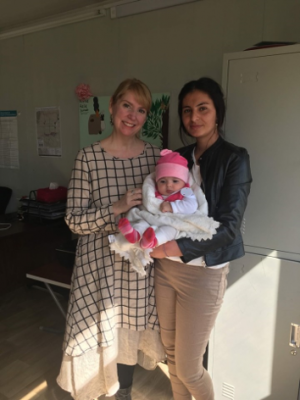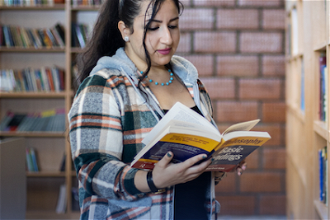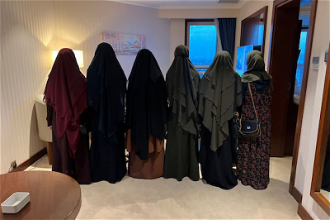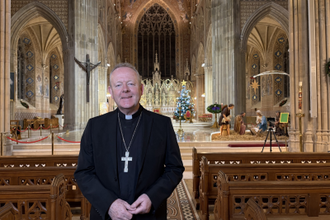Eyewitness: from the Camino de Santiago to Iraqi Kurdistan

Jane with Yezidi mother in IDP camp northern Iraq
In August of 2014, Jane Drichta was on a pilgrimage, walking the Camino de Santiago de Compostela, in Spain. The British-American midwife spent most of the journey unplugged from modern distractions. However, when she visited bars and cafes along the route, she watched news reports about the advance of Islamic State or Daesh into northern Iraq. Both the Iraqi army and the Kurdish Peshmerga forces had vanished, leaving the Christian and Yezidi populations there at the mercy of Islamic State.
"That was when I learned about the unfolding Yezidi genocide," Jane recalls. "The sheer audacity of Daesh offended me; the nerve, to launch a targeted genocide, in full view of the world. It was as if they were daring the global community to respond. The systematic use of gender-based violence, and the exploitation of women to further a homicidal, terrorist agenda shook me," she adds. "That walk on the Camino changed my life."
Within a year, Jane, a graduate of St Louis University, a Jesuit college, was working in Iraqi Kurdistan. She was working with an NGO hoping to set up an aid project, and she interviewed staff at the Free Yezidi Foundation (FYF) to find out how plausible it would be to run a programme in the region. She met them at Khanke Camp, a desolate spot forty minutes' drive from the Kurdish city of Dohuk. Yezidi had fled to the camp from Sinjar, the area where they had lived for centuries. The less fortunate men and boys had been killed by Islamic State, while women and girls had been enslaved and were being bought and sold by local Arab supporters of Islamic State using WhatsApp.
"A few months after that, I met Pari Ibrahim, the founder of FYF, when she was in Seattle, where I live," said Jane. "Some weeks later, Pari called and offered me the job of Country Director. I couldn't say no, nor did I want to."
She set up her office in Khanke Camp, aware she was suddenly in charge of everything, creating order out of chaos. The Free Yezidi Foundation provides education for children, vocational training for women, and psychological counselling for survivors of Islamic State who escaped captivity. On a daily basis Jane was approached by Yezidi with life-shattering problems: a woman with advanced cancer who had no money for the bus fare to the hospital in Dohuk for treatment; a young woman who had given birth after being repeatedly raped by Islamic State supporters, and whose family rejected the infant; and a regional government bureaucracy adjusting to having thousands of internally displaced people in its midst.
She moved into a rented flat in a compound of high-rise flats, but it was a struggle to stay cool in the summer, when temperatures were regularly in the 40s C. At night, the flares of oil wells flickered at the tops of the nearby mountain ridge. By day, she commuted to the camp, witnessing the seemingly normal world around her, as Kurdish people got on with their lives, building new housing estates, shopping in malls and eating delicious Middle Eastern banquets at fashionable restaurants. It was in stark contrast to the meagre existence endured by Yezidis in the camp.
Jane says building relationships was not easy at first because, "the Yezidi are not demonstrative as a rule. They are insular by nature, isolated by choice, and not quick to trust outsiders. I often felt isolated in a way that was unfamiliar, despite my 15 years of international work." She believes their conservative nature owes something to their centuries of persecution (they have been subjected to more than 700 genocides). She is grateful to modern technology for allowing her to stay in touch with her husband and grown-up daughter back in the States, although weak WiFi made it difficult to keep up with English soccer.
She praises her local FYF staff for making her work possible. "Their ability to summarise our challenges - I had some Kurdish but was by no means capable of translating - to tell me what I needed to know, to lay out my choices in a given situation succinctly, was incredible. But also, their ability to listen to me, to see how my experiences could be adapted to this context, and help me implement our programming, was gratifying."
What Jane fails to mention is that she reinvested all her pay in a local project for the Global Motherhood Initiative, an NGO which she started. It provides midwife support for expectant mothers, and maternity advice and care for babies up to three months of age. She subsidising her stay in Iraq using her earnings from working as a midwife in the USA. Her postgraduate Global Public Health degree from Queen Mary's College, London, has clearly been put to practical use.
Jane is also reticent to discuss the danger she faced, running breastfeeding seminars in Mosul as allied forces bombed Islamic State in 2017.
"Daesh wasn't letting food into the city, and people were watering down tomato ketchup for their children and making soup out of cardboard. If babies couldn't be breastfed, then they would die, and many did. I trained people to nurse again after they had stopped, and enhanced milk production."
"The Yezidi's position in Iraq is complex, but simple at the same time," she stresses. "Their trauma is literally immeasurable, the epigenetic legacy unfathomable. There is not a single Yezidi alive who is not affected by the events of 2014-17 and those that went before."
Her stories about the treatment of Yezidi girls and women at the hands of Islamic State are medieval in their horror. Used as domestic slaves, Yezidi women were abused by Islamic State brides, and traded between men who had previously been their neighbours.
"One woman in the camp couldn't bear to go into a shop here because it reminded her of the exchange of money when she was bought and sold more than a dozen times."
Jane adds that thousands of Yezidi women remain enslaved in Iraq, Syria and Turkey. "But none of these countries is interested in locating them, or prosecuting Islamic State members for deliberately persecuting the Yezidi because of their ethnicity and religion, attempting to eliminate them: that's called genocide."
Reluctant to talk about herself, Jane turns the conversation to what can be done now. "What can you do about the situation facing the Yezidi? Write a letter or blog for online or print media? Fantastic. Tell your friends and raise money? Visit: www.freeyezidi.org Amazing. Say a prayer, centre a meditation? Let's do it. Tell your children about this ancient culture? Good on you. At the end of the day, that is why we exist: To help each other. What will you do?" she asks.


















